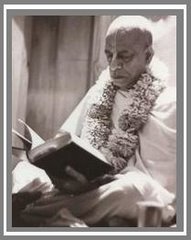 Education is a method by which we can realise the Truth. There are many truths, History, Geography as is Mathematics. The content of truth is greatest in Mathematics. In others, there is an element of imagination. In Geography, we come across names like Asia, Africa, Madras, Ohio, etc. These names were given by humans. By imagination, we have given names "plateau" "valley", etc. By a process of gradual elimination of all that is imaginary, when we arrive at truth, that Truth is bound to be God. To think of Him with real devotion is the fruit of real education.
Education is a method by which we can realise the Truth. There are many truths, History, Geography as is Mathematics. The content of truth is greatest in Mathematics. In others, there is an element of imagination. In Geography, we come across names like Asia, Africa, Madras, Ohio, etc. These names were given by humans. By imagination, we have given names "plateau" "valley", etc. By a process of gradual elimination of all that is imaginary, when we arrive at truth, that Truth is bound to be God. To think of Him with real devotion is the fruit of real education.What is the use of education? Its first use is to develop humility (vinaya). In days past, the disciple who went to a guru was called "vineyan" meaning a person of humility which is the hall-mark of Instruction he received from his guru, the fruit of education. Education without humility is no education. Education is the same today as it was before, but methods have changed. The medicine is the same but if the diet has changed, the medicine becomes poison.
Unfortunately education has today become merely the means of livelihood. and false prestige . For true education, the student should go to a guru, remain humble and follow his advice.
Real education should help us realize that God is in fact a true reality. Real knowledge will f
 ill our being with good qualities, through which one can realise the Truth, that is Krsna. Therefore, the goal of knowledge is understanding the Ultimate Truth. The first fruit of education must be humility and self control. Total surrender to the Lord is a means of learning our insignificance and the transcendent grace of the Lord.
ill our being with good qualities, through which one can realise the Truth, that is Krsna. Therefore, the goal of knowledge is understanding the Ultimate Truth. The first fruit of education must be humility and self control. Total surrender to the Lord is a means of learning our insignificance and the transcendent grace of the Lord.If we engage an inquiry into the Atman (soul), at the end of it, it will be clear that Krsna is in our heart as the Supersoul. When that stage is reached all samskaras will gradually fall away. But, until then, we must engage in sadhana bhakti directing all our activities toward pleasing Guru and Krsna.
Those who are leaders of a group, society, or state should not neglect to established devotional customs and practices. For themselves they may not be in need of such ceremonies, for instance, their advancement in spirituality may not require them. But if they begin to neglect them, people for whom the rituals are really helpful, will also start neglecting them. This would be setting a bad example. In the words of the Bhagavad Gita, the wise should not unsettle the minds of those who are ignorant, and are attached to action: on the contrary, he should encourage them to perform what they should perform, by himself setting the example well and with diligence. It is the duty of leaders and those that are at the top to lead the people from where they are, and not to refrain from participation in devotional practice.


















